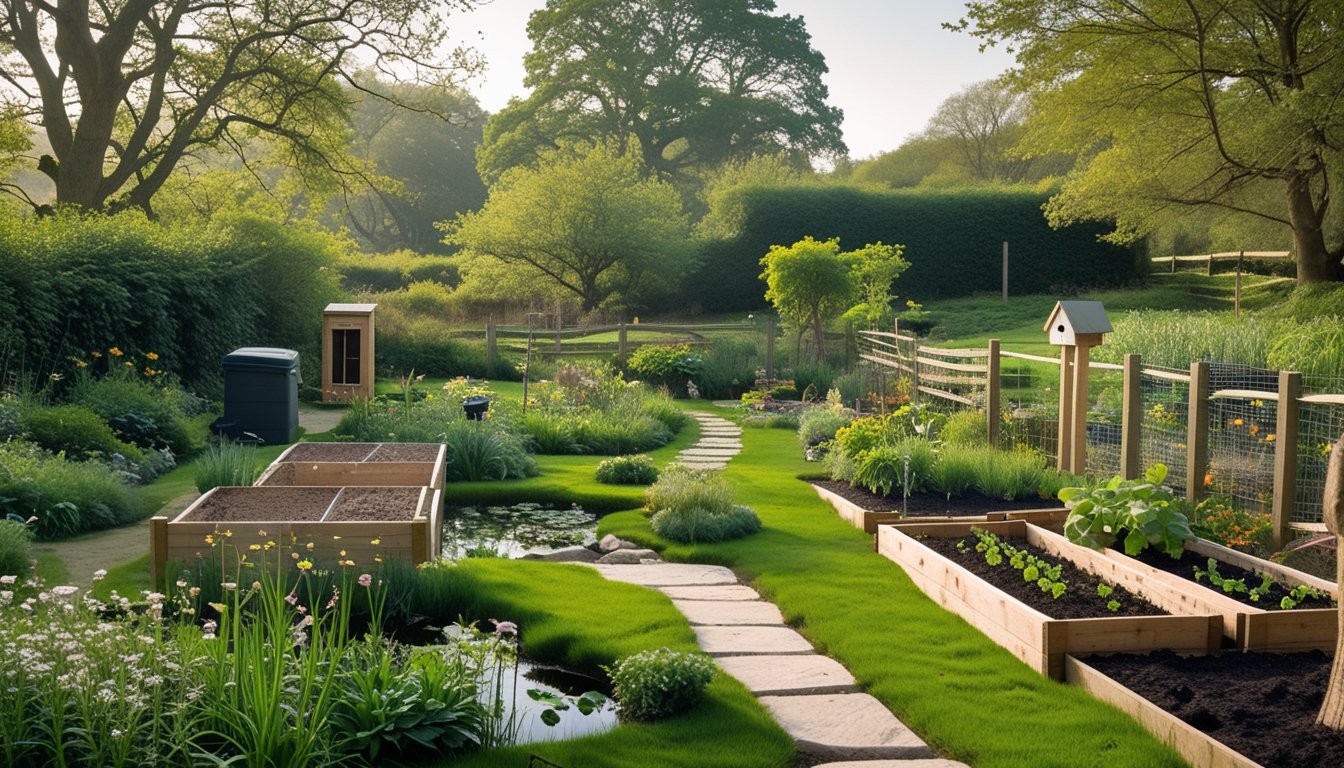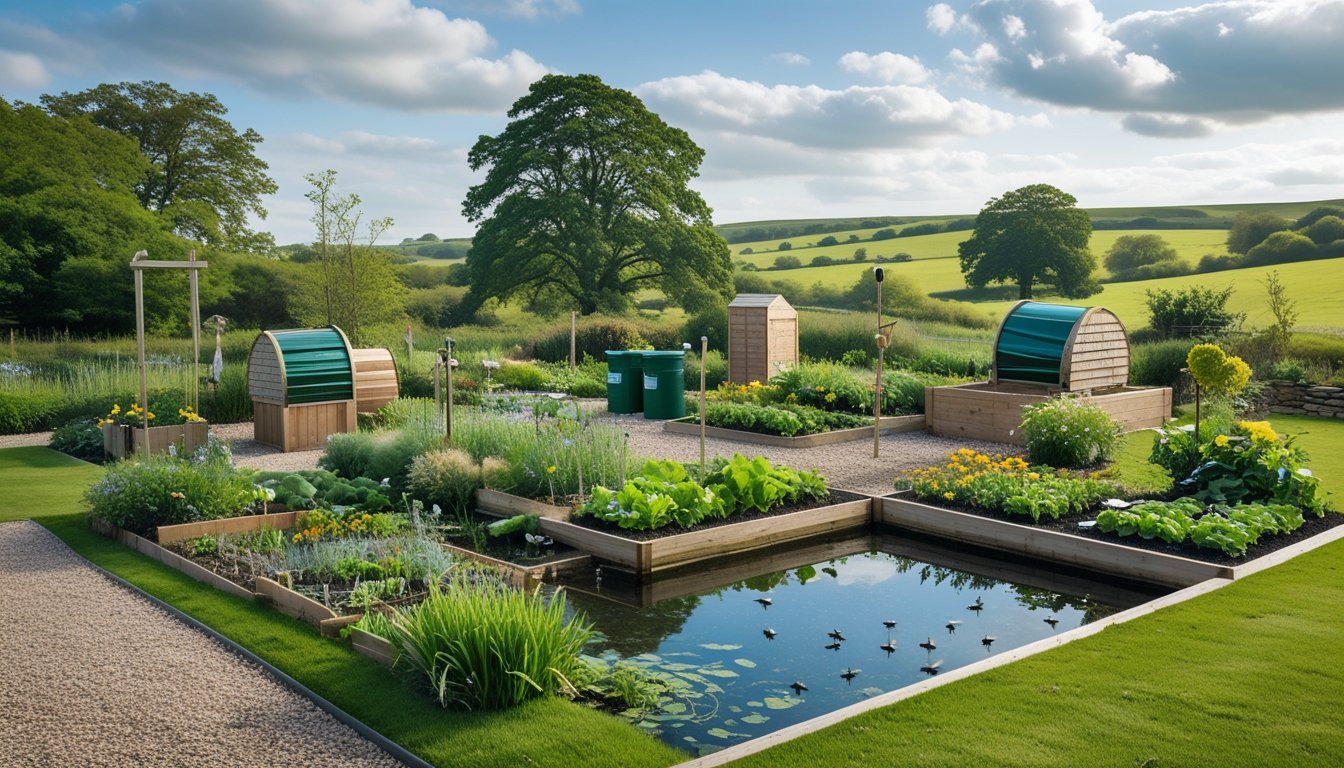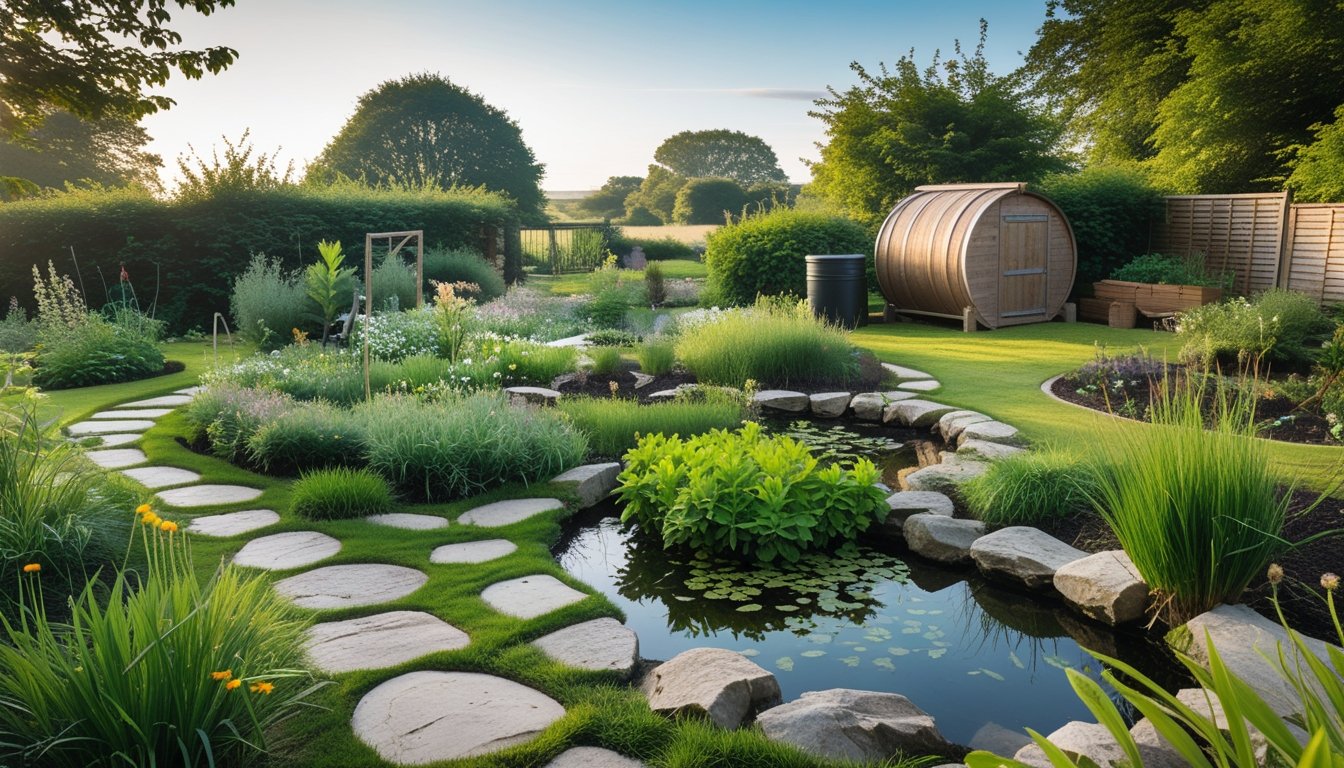Late updated: 18 Nov 2025 15:11
Written by: Oliver Bennett
Eco-Friendly Landscaping Ideas For Rural UK Gardens: Sustainable Solutions
Creating eco-friendly rural gardens in the UK is an inviting challenge that blends natural beauty with environmental responsibility. In this blog post, we explore innovative landscaping ideas that not only enhance your garden's charm but also support local ecosystems. Embracing native plants and sustainable practices can significantly reduce maintenance demands while boosting biodiversity.

As our climate changes and resources become scarcer, integrating sustainable features in garden planning becomes essential. We delve into practical solutions like water-saving techniques, the use of recycled materials, and wildlife-friendly plant choices. These methods offer aesthetic appeal while contributing positively to the environment.
For those ready to take their gardens to the next level, our ideas extend beyond the basics to include advanced strategies such as drought-resistant landscaping and eco-friendly garden structures. By incorporating these elements, we can create outdoor spaces that are both functional and sustainable.
Key Takeaways
- Integrate native plants to enhance biodiversity.
- Implement water-saving techniques in garden planning.
- Explore advanced sustainable features for long-term benefits.
Core Eco-Friendly Landscaping Ideas for Rural UK Gardens

Creating a sustainable garden involves applying various eco-friendly landscaping techniques, particularly within rural settings. We focus on incorporating native plants, supporting local wildlife, managing water resources wisely, and utilising natural or recycled materials.
Planting Native Species for Low Maintenance
Integrating native plants is crucial in building an eco-conscious garden. Foxgloves, hawthorn, and lavender are not only suited to the UK climate but also minimise the need for ongoing maintenance. These plants are hardy, requiring minimal water and care, which suits busy gardeners. We can also consider evergreen shrubs and sedum for year-round structure and appeal.
Additionally, native plants bolster biodiversity by providing food and habitat for local wildlife. This approach creates a resilient landscape that's harmonious with the surrounding ecosystem.
Supporting Pollinators and Wildlife
Supporting biodiversity in our gardens benefits both flora and fauna. Pollinators like bees and butterflies play a vital role in garden ecosystems. By planting a variety of flowering plants, we can foster a habitat for these essential creatures. Companion planting and vegetable gardens can further encourage pollinators by offering diverse food sources.
We also focus on creating shelters for wildlife. Building insect hotels, setting up log piles, and maintaining hedgerows can offer shelter to creatures like hedgehogs. These actions support a thriving garden environment and enrich its ecological balance.
Sustainable Water Management Approaches
Water conservation is a key component of sustainable landscaping. Rainwater harvesting systems, such as water butts, are simple yet effective. They capture and store rainwater for use during dry spells, reducing reliance on mains water.
Additionally, using permeable paving allows rain to seep into the ground, replenishing water tables and preventing runoff. Mulching helps retain soil moisture, reducing the need for frequent watering. These solutions contribute to sustaining water resources in rural gardens.
Natural Materials and Recycled Solutions
Incorporating natural and recycled materials is vital for reducing environmental impact. Reclaimed materials such as wood, stone, and brick are excellent for hardscaping and constructing raised beds. These materials blend seamlessly with the rustic aesthetic of rural gardens.
In our sustainable garden, we choose to use these materials mindfully. They often require less processing and transport, reducing the garden's carbon footprint. By integrating recycled materials, we mend the gap between functionality and environmental responsibility.
Advanced Eco-Friendly Features and Maintenance Practices
Incorporating advanced eco-friendly features into our rural UK gardens helps us promote sustainability and enhance biodiversity. We focus on innovative techniques like year-round planting and organic soil health improvements, which work together to support vibrant, eco-conscious landscapes.
Year-Round Planting Strategies
Implementing year-round planting strategies is essential for maintaining an eco-friendly garden in a rural setting. By selecting a mix of both evergreen shrubs and deciduous plants, we ensure continuous growth and colour throughout the seasons. We emphasise companion planting, where plants are strategically placed together to maximise growth potential and reduce pest issues naturally.
Reclaimed materials can be used to construct aesthetically pleasing raised beds. These structures not only enhance drainage and soil warmth but also facilitate better access to plants. Seasonal pruning and thoughtful plant selection further extend the flowering and fruiting periods, making our gardens more resilient and visually appealing.
Natural Pest Management Techniques
Natural pest management is vital for maintaining a balanced ecosystem within our gardens. Companion planting is a key technique we use, pairing pest-resistant plants like marigolds and garlic alongside more susceptible species. This creates a pest-deterrent environment without resorting to chemical treatments.
Insect hotels and log piles offer habitats for beneficial insects, which in turn help control pest populations. By introducing natural predators such as ladybirds and birds, along with creating habitats that encourage their presence, we effectively manage pests while promoting biodiversity. Bird baths and water features can attract pest-controlling species, enhancing the ecological balance in our gardens.
Enhancing Soil Health Organically
Healthy soil is foundational to sustainable gardening. We prioritise organic methods to improve soil health, using techniques such as mulching with natural materials like straw or wood chips. This adds organic matter, conserves moisture, and suppresses weeds.
Composting and integrating organic matter from kitchen scraps contribute essential nutrients to our soil. Incorporating crop rotation and cover crops also maintains soil fertility and reduces erosion. By focusing on these organic methods, we support strong root systems and minimise soil disturbance, ultimately fostering a thriving garden ecosystem.
Wildlife Habitats and Sustainable Garden Structures
Creating habitats for wildlife within our gardens is crucial for biodiversity. Structures like log piles and insect hotels provide shelter for a wide range of species, supporting natural pest control and pollination. We use reclaimed materials to build sustainable structures such as birdhouses and bat boxes, which enhance our gardens' ecological functions.
Incorporating water features can attract amphibians and insects, broadening the range of wildlife in our gardens. Additionally, we design Hedge corridors using evergreen shrubs to link habitats and create corridors for small mammals. These practices not only support local wildlife but enrich our garden ecosystems, making them vibrant and diverse.
Frequently Asked Questions

In designing an eco-friendly rural garden in the UK, it’s essential to focus on native plants, biodiversity, water conservation, pest control, low-maintenance design, and the use of renewable resources.
What are the top native plants to incorporate for a sustainable rural garden in the UK?
Native plants are vital for sustainable gardening. Species like foxgloves, bluebells, and primroses thrive naturally. They require less water and maintenance while providing essential habitats for local wildlife.
How can one maximise biodiversity in a rural UK garden setting?
To maximise biodiversity, include a variety of plants, and create diverse habitats such as ponds and hedgerows. Providing food, water, and shelter for different species will encourage a thriving ecosystem.
What are effective water conservation methods for UK rural gardens?
Rainwater harvesting and drip irrigation are effective methods to conserve water. These techniques ensure plants receive the essential moisture without wasting water, especially during dry spells.
What eco-friendly pest control options are recommended in rural UK gardens?
Utilising natural predators like ladybirds and hedgehogs helps manage pests without chemicals. Introducing companion planting can deter harmful insects and promote a healthy garden.
How to design a rural garden landscape that requires minimal upkeep in the UK?
Choose slow-growing plants and resilient ground covers. Implement smart design principles that consider local climate and soil, reducing the need for frequent maintenance.
What renewable resources can be utilised for rural garden landscaping in the UK?
Solar lighting, rainwater collection systems, and composting are excellent ways to incorporate renewable resources. These not only enhance sustainability but also reduce reliance on non-renewable energy sources.
